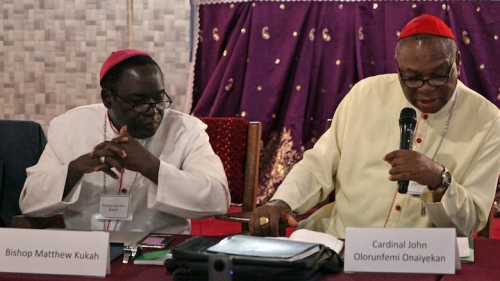
Nigeria, one of the world’s most religious nations—where religious identity and religious freedom are considered of primary importance—continues to experience high levels of distrust between persons of different religious affiliation and a heightened concern about religious conflict. In 2017, the U.S. Commission on International Religious Freedom once again designated Nigeria as a “Country of Particular Concern” listing one of its chief concerns—the failure of the Nigerian government to effectively prevent sectarian violence or punish those responsible for such violence.
In light of these troubling developments, the MacMillan Center’s Project on Religious Freedom and Society in Africa in partnership with The Kukah Center hosted a workshop, titled “Freedom, Interfaith Relations, and Civil Society in Nigeria,” in Abuja, Nigeria, on March 15-16 at the Pope John Paull II Conference center. The project’s director, Professor Lamin Sanneh summarized the need for the workshop, “The politicization of religion and ethnicity has brought great harm to interfaith harmony and neighborliness, with destabilizing consequences for society as a whole. Tribalism and religious fundamentalism accentuate the divisions that hinder our capacity for mutual charity and forbearance. Reflection on how civil society may help counteract the tendency of politicization and be a source of moderation and civic engagement is necessary to help move the discussion forward.”
Catholic Archbishop of Abuja Cardinal John Onaiyekan, conference convener, welcomed the diverse group of Christian and Muslim religious leaders and academics, government ministers, former governors, and human right activists. He encouraged the workshop participants to seriously engage the issue of religious freedom in the context of the multi-religious nature of Nigerian society. He also suggested, whether here or at future workshops, issues such as “the place of Islamic Sharia in our national legal system; religion in government; the status of some “traditional rulers” with claims of religious authority and responsibility; and the scope and limits of the secularity of the Nigerian state need to be addressed.”
Ibrahim Ashafa, Professor of History at Kaduna State University, presented some thoughts on Faith and Society in Muslim Africa. Though the concept of “civil society” is not well developed in Islam, Ashafa suggested important values and directives indispensable to a good society are found in important first-millennium Islamic source materials. From these documents, Muslims (leaders and followers) learn the importance of “humility, sincerity, allegiance, consensus, rights of followers and duties of leaders, co-existence in a plural society, moral values in politics, equality in the society, the concept of justice, a concern for the weak, poor and the vulnerable, and freedom of religion.” Professor Ashafa expressed concern that fundamentalist reform movements funded by Iran and Saudi Arabia, though relatively small, are undermining the traditional co-existence between religious adherents in Sub-Saharan Africa.
Recent Jackson Institute for Global Affairs speaker, Peter Obi, the former governor of Anambra State, spoke to the need for Nigerians to engage the political class, “This is critical because, for any society, if you get most things right and your politics is wrong, everything will go wrong.”
“Our major problem today is that our politics is wrong; it is transactional rather than transformational. People go into politics for every reason other than for service and sacrifice for the good of all. Therefore, there is a need for all groups of stakeholders, especially religious groups and civil societies, to meaningfully engage the political class on good governance and doing what is right for the society.”
Workshop participants included: Dr. Sam Amadi, former Chairman and Chief Executive of the Nigerian Electricity Regulatory Commission (NERC); Dr. Olukayode Fayemi, former Governor of Ekiti State and current Minister of Solid Minerals Development; Archbishop Egbunu (Anglican Diocese of Lokoja); Bishop Matthew Hassan Kukah (Catholic Diocese of Sokoto); Dr. Mike Kwanashie, Vice-Chancellor at Veritas University, Abuja, Nigeria; Chidi Odinkalu, Chair of the Governing Council of Nigeria’s National Human Rights Commission; Hon. Edward Pwajok, member of the Federal House of Representatives and former Attorney General of Plateau State.
The workshop concluded with a call for a second interfaith workshop with key religious leaders and policymakers to be scheduled later in 2018. Bishop Kukah and The Kukah Centre will facilitate the next meeting.
Written by Michael Glerup, Executive Director of the Project on Religious Freedom & Society in Africa
